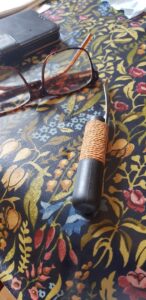The peeler, although this was only five or six years ago, struck me as coming from my childhood – the 1950s or 60s maybe. It had a broad, pointed metal blade with a slit in it which did the peeling. The blade was attached, by tightly-wrapped orange string, to a wooden handle.
The peeler, according to the box it came in, was made in the UK and there was a telephone number on it, presumably so I could cope with any technical difficulties or order new peelers for my friends.
So I bought one, for less than £1, and phoned the company to ask why they hadn’t realised that Britain no longer manufactured cheap and useful household goods, leaving that sort of thing to other countries.
I asked to speak to the press department, but the receptionist said she would put me through to the managing director, who answered so quickly that I concluded he was probably in the same room and possibly on the same phone.
He had a delightful Black Country accent (which sounds like a contradiction, but he was so friendly and enthusiastic that any sort of accent would have won me over) and he explained that ‘metal bashing’ of various sorts had been the family business for decades – the peeler bring a being only one of many example s.
He accepted that the other countries did make a similar-looking product, but the give-away difference was that the orange string was not string at all, but was moulded in plastic as part of the handle.
The Black Country string was real and wrapped around the handle before being secured, without pins, knots or glue by a process which he called ‘sort of doubling back on itself’. He couldn’t do it himself but one of his workers who was especially deft had been doing it for decades, and he didn’t know what would happen to the peeler side of the business should she become troubled with arthritis, or decide she needed to move on from string-winding.
As the interview with the managing director was winding down, I asked him whether there had been any interesting developments in peeler technology during his time in the peeler industry.
Well, he said, there had been the invention of the left-handed peeler, although he couldn’t say much about that because he had never peeled anything in his life on account of only having one hand. I know, as a journalist, that I should have followed this up in some way but found myself speechless, disability being a difficult area for the over-sensitive.
And all this came back as an unintended consequence of the present lockdown, which causes you to notice things you haven’t noticed in years. I found, during an idle moment, the Black Country peeler at the back of a kitchen drawer and reflected that it had hardly ever been used because, whatever its proud industrial heritage, it’s no more use than any short, sharp knife,
See picture below
Thank you Oliver, I used to have one similar, not seen it for ages, and yes the Midlands accent is a delight…….until next time
The Black Country refers to a region of more than one million people covering most of the four Metropolitan Boroughs of Dudley, Sandwell, Walsall and Wolverhampton. The first trace of the phrase “The Black Country” as an expression dates from the 1840s. The name is believed to come from the soot from the heavy industries that covered the area, although the 30-foot-thick (10-metre) coal seam close to the surface is another possible origin. Back then the population experienced perpetual twilight reigns during the day, and during the night fires on all sides would light up the dark landscape with a fiery glow. Sourced The Black Country Living Museum: bclm.co.uk


